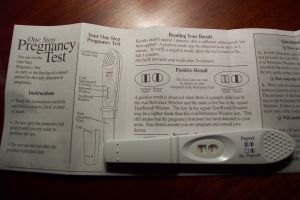By Rita Brhel, managing editor and attachment parenting resource leader (API)
 Pregnant women know better than anyone how connected they can feel to the new, little life growing inside them – even if the baby is so tiny that its kicks can’t be felt. From the moment, a woman learns she’s pregnant, she begins counting down the months and days until she can meet her baby face-to-face.
Pregnant women know better than anyone how connected they can feel to the new, little life growing inside them – even if the baby is so tiny that its kicks can’t be felt. From the moment, a woman learns she’s pregnant, she begins counting down the months and days until she can meet her baby face-to-face.
Morning sickness, while irritating, is a sign that the pregnancy is going well, according to the American Pregnancy Association – which is especially assuring to a particularly anxious mother-to-be or someone who experienced a threatened miscarriage early on.
Morning sickness also provides a time for fathers-to-be to connect to their babies…by way of better connecting with their wives. After all, one of the best models of a healthy relationship for a child, in addition to the parent-child bond, is the mother-father interaction.
Just as new fathers often enjoy putting a hand on the mother’s pregnant belly and reading stories to the unborn child, they can begin bonding by providing comfort to the mother-to-be, which will also keep the adult-adult relationship close during a time when exhaustion and mood swings may threaten to push them apart.
Australian filmmaker Troy Jones explored this in his documentary Being Dad: Information and Inspiration for Dads to Be, as reported by Tara Taylor of www.parentspress.com: “A few topics always came up in the group conversations. The first was how to help your partner with morning sickness. Many expecting fathers felt helpless in the face of nausea.”
First and foremost, mothers-to-be must understand this feeling from their partners and to focus on ways he can stay connected during the pregnancy, especially when the women are not feeling their best. Here are some ideas to help you better involve your husbands’ or partners’ desire to help when morning sickness, fatigue, mood swings, backaches, and other pregnancy discomforts begin taking their toll on your relationship:
- Encourage honest and open communication – This was the most important tool offered by R. Morgan Griffin’s 2003 article “Advice for Expectant Fathers” on www.medicinenet.com. Not only will talking help you release your frustrations and fears about pregnancy, childbirth, and parenting, but it provides a way for men to voice their anxieties, too, and be able to help you by providing emotional support.
- Put him on nutrition duty – According to www.mrdad.com, the father-to-be can be a pregnant woman’s personal cheerleader, not only in reminding you that morning sickness is a good thing but also in encouraging you to drink enough water and helping you to choose healthy foods – when you’re able to keep food down. The same encouragement may be needed when it comes to taking the prenatal vitamin and letting the mother-to-be know that it’s OK to go to bed early or take a mid-day nap, rather than continuing to try to do everything you could do before getting pregnant.
- Give him specific requests – Also according to MrDad.com, if you know of something your husband can do to help you feel better, let him know. Perhaps, it’s bringing toast to your bedside in the morning or giving you a backrub or making sure that the fridge is cleaned out of odorous foods.
Morning sickness also provides a time for fathers-to-be to connect to their babies…by way of better connecting with their wives.
